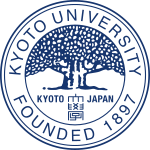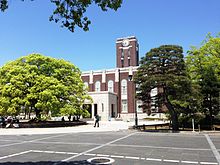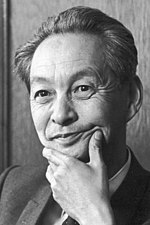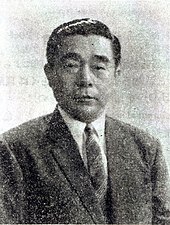Kyoto University
This article needs additional citations for verification. (October 2018) |
京都大学 (Japanese) | |
 | |
| Motto | Japanese: 自由の学風 |
|---|---|
Motto in English | Freedom of academic culture |
| Type | Public (National) |
| Established | June 18, 1897 |
| Endowment | ¥ 316 billion (2.4 billion USD) |
| President | Nagahiro Minato[1] |
Academic staff | 3,480 (Teaching Staff)[2] |
Administrative staff | 3,978 (Total Staff)[2] |
| Students | 22,615[2] |
| Undergraduates | 13,038 [2] |
| Postgraduates | 9,308 [2] |
| Location | , , 35°01′34″N 135°46′51″E / 35.026212°N 135.780842°E |
| Campus | Urban, 135 ha (333 acres) |
| Athletics | 48 varsity teams |
| Colors | Dark blue[3] |
| Nickname | Kyodai |
| Affiliations | Kansai Big Six, ASAIHL |
| Website | www |
 | |
Kyoto University (京都大学, Kyōto daigaku), or KyotoU (京大, Kyōdai), is a public research university located in Kyoto, Japan. Founded in 1897, it is one of the former Imperial Universities and the second oldest university in Japan.
Founded upon the principles of its motto, “freedom of academic culture”, KyotoU is currently composed of three campuses with ten Faculties, eighteen Graduate Schools, thirteen Research Institutes, and twenty-two Research and Educational Centers. The Kyoto University Library, boasting over 7 million volumes, is Japan's second-largest academic library.[4] Furthermore, KyotoU was one of the first three Designated National Universities and is categorized by the Japanese government as a Top Type university in the Top Global University Project. As of March 2019, the university's total net assets were valued at 316 billion JPY.[5] Advocating for international collaboration in education and research, KyotoU has partnerships with various academic institutions outside Japan.
Kyoto University has generated 5 prime ministers of Japan and 1 president of Taiwan to date, and is famed for producing world-class researchers. As of October 2019, 19 Nobel Prize laureates, 2 Fields medalists, and 1 Gauss Prize winner have been affiliated with Kyoto University, giving it the most Nobel laureates of all universities in Asia.
History
Kyoto University's forerunner was the Chemistry School (舎密局, Seimi-kyoku) founded in Osaka in 1869, which, despite its name, taught physics as well (舎密 is a transcription of a Dutch word chemie). Later, the Third Higher School (第三髙等學校, Daisan-kōtō-gakkō), was established in the place of Seimi-kyoku in 1886, it then transferred to the university's present main campus in the same year.
Kyoto Imperial University (京都帝國大學, Kyōto-teikoku-daigaku) as a part of the Imperial University system was established on June 18, 1897,[6] using the Third Higher School's buildings. The higher school moved to a patch of land across the street, where the Yoshida South Campus stands today, and was integrated into Kyoto University in May 1949 and became the College of Liberal Arts in September 1949.[7][8] In the same year of the university's establishment, the College of Science and Technology was founded. The College of Law and the College of Medicine were founded in 1899, the College of Letters in 1906, expanding the university's activities to areas outside natural science.
After World War II, the current Kyoto University was established by merging the imperial university and the Third Level School, which assumed the duty of teaching liberal arts as the Faculty of Liberal Arts (教養部, Kyōyō-bu). The faculty was dissolved with the foundation of the Faculty of Integrated Human Studies (総合人間学部, Sōgō-ningen-gakubu) in 1992.
Kyoto University has since 2004 been incorporated as a national university corporation under a new law which applies to all national universities.
Despite the incorporation which has led to increased financial independence and autonomy, Kyoto University is still partly controlled by the Japanese Ministry of Education (文部科学省, Monbu-kagaku-shō).
The university's Department of Geophysics and their Disaster Prevention Research Institute are represented on the national Coordinating Committee for Earthquake Prediction.[9]
Campuses


The university has three campuses in Yoshida, Kyoto; in Katsura, Kyoto; in Gokashō, Uji
Yoshida Campus is the main campus, with some laboratories located in Uji. The Graduate School of Engineering is currently under process of moving to the newly built Katsura Campus.
Organization
The university has about 22,000 students enrolled in its undergraduate and graduate programs.
Faculties



Kyoto University has 10 faculties.[10]
- Faculty of Integrated Human Studies
- Faculty of Letters
- Faculty of Education
- Faculty of Law
- Faculty of Economics
- Faculty of Science
- Faculty of Medicine
- Faculty of Pharmaceutical Sciences
- Faculty of Engineering
- Faculty of Agriculture
Graduate schools
Kyoto University has 19 graduate schools.[10]
Academic
- Graduate School of Letters
- Graduate School of Education
- Graduate School of Law
- Graduate School of Economics
- Graduate School of Science
- Graduate School of Medicine
- Graduate School of Pharmaceutical Sciences
- Graduate School of Engineering
- Graduate School of Agriculture
- Graduate School of Human and Environmental Studies
- Graduate School of Energy Science
- Graduate School of Asian and African Area Studies
- Graduate School of Informatics
- Graduate School of Biostudies
- Graduate School of Global Environmental Studies
Professional
- School of Government
- Graduate School of Management
- Kyoto University Law School
- Kyoto University School of Public Health
Academics
This section needs expansion. You can help by adding to it. (January 2010) |
Kyoto University promotes itself as an academic institution fostering a "spirit of freedom".[11] The university claims eleven Nobel Laureates and two Fields Medalists among its faculty and alumni. The university is also known as the starting point for the Kyoto School philosophical movement.
Notable research institutes and facilities
- Yukawa Institute for Theoretical Physics
- Research Institute for Mathematical Sciences
- Primate Research Institute
- Kosobe Conservatory
- Seto Marine Biological Laboratory
Academic rankings
This section may contain an excessive amount of intricate detail that may interest only a particular audience. (February 2021) |
| T. Reuters National[12] | Research | 2 | |
|---|---|---|---|
| WE National[13] | Employment | 10 | |
| NBP Kansai[14] | Reputation | 1 | |
| Shimano National[15] | Selectivity | SA | |
| QS Asia (Asia version)[16] | General | 7 | |
| ARWU Asia[17] | Research | 2 | |
| THE World[18] | General | 74 | |
| QS World[19] | General | 32 | |
| ARWU World[17] | Research | 24 | |
| ENSMP World[20] | Alumni | 5 | |
| Social Sciences & Humanities | |||
|---|---|---|---|
LAW | |||
| Asahi National[21] | Research | 6 | |
| Natural Sciences & Technology | |||
Engineering | |||
| Kawaijuku National[22] | General | 2~3 | |
| QS World[23] | General | 20 | |
MATERIALS SCIENCE | |||
| T.Reuters National[24] | Research | 4 | |
| T.Reuters World[24] | Research | 22 | |
PHYSICS | |||
| T.Reuters National[24] | Research | 4 | |
| T.Reuters World[24] | Research | 25 | |
CHEMISTRY | |||
| T.Reuters National[24] | Research | 1 | |
| T.Reuters World[24] | Research | 4 | |
BIOLOGY & BIOCHEMISTRY | |||
| T.Reuters National[24] | Research | 2 | |
| T.Reuters World[24] | Research | 23 | |
MATHEMATICS | |||
| ARWU National[25] | Research | 1 | |
| ARWU World[25] | Research | 19 | |
| Life Sciences | |||
IMMUNOLOGY | |||
| T.Reuters National[24] | Research | 3 | |
| T.Reuters World[24] | Research | 25 | |
PHARMACOLOGY & TOXICOLOGY | |||
| T.Reuters National[24] | Research | 2 | |
| T.Reuters World[24] | Research | 30 | |
| * T. Reuters World rankings include non-educational institutions | |||
Kyoto University is considered one of the most prestigious universities in Japan, and is consistently ranked second in Japan and in the top ten in Asia by Academic Ranking of World Universities, Times Higher Education, QS World University Rankings.[note 1]
The university was ranked 3rd in 2008 and 2010 in the ranking "Truly Strong Universities" by Toyo Keizai.[27] In another ranking, Japanese prep school Kawaijuku ranked Kyodai as the 2nd best university in Japan.[28]
Research performance
Kyodai is usually considered one of the top research institution in Japan. In fact, it has the second largest number of investment from Grants-in-Aid for Scientific Research, which is the national grants program for research institutions.
This financial support from the Japanese government has a direct effect on Kyodai's research outcomes. According to Thomson Reuters, Kyodai is the No.1 research university in Japan.[12] Its research excellence is especially distinctive in Chemistry (1st in Japan, 4th in the world), Biology & Biochemistry (2nd in Japan, 23rd in the world), Pharmacology & Toxicology (2nd in Japan, 30th in the world), Immunology (3rd in Japan, 25th in the world), Material Science (4th in Japan, 22nd in the world), and Physics (4th in Japan, 25th in the world).[29]
In another ranking, Nikkei Shimbun on 2004/2/16 surveyed about the research standards in Engineering studies based on Thomson Reuters, Grants in Aid for Scientific Research and questionnaires to the heads of 93 leading Japanese Research Centers. Kyodai was placed in the 10th position (research planning ability 6th) in this ranking.[30]
Kyodai also has a high research standard in Social Sciences & Humanities. Repec in January 2011 ranked Kyodai's Institute of Economic Research as Japan's 3rd best economic research institution.[31] Kyodai has provided 6 presidents of the Japanese Economic Association in its 42-year history, which is the 3rd largest number.[32]
Asahi Shimbun summarized the number of academic papers in Japanese major legal journals by university, and Kyodai was ranked 6th for the period between 2005 and 2009.[21]
Graduate school rankings
Kyodai Law School is considered one of the top law schools in Japan. From 2007 to 2017, it was ranked 2nd out of the 74 law schools in Japan for bar examination pass ratio, at 79.93%.[33] In 2019, Kyodai Law School became 1st out of the 72 law schools in Japan, with a pass ratio of 62.69%.[34][35]
Eduniversal ranked Japanese business schools, and the Faculty of Economics in Kyodai is placed 4th in Japan (111th in the world).[36]
Kyoto University has the second highest deviation and difficulty level after the University of Tokyo as a university in Japan.[37]
Alumni rankings
Kyodai alumni are distinctively successful in Japanese industries such as shown below.
According to the Weekly Economist's 2010 rankings, graduates from Kyodai have the 10th best employment rate in 400 major companies in Japan.[38] However, it has to be noted that this lower ranking position is because of the large number of alumni who become government bureaucrats, which is 2nd largest among Japanese universities.[39]
Mines ParisTech: Professional Ranking of World Universities ranks Kyodai as 5th in the world in 2011 in terms of the number of alumni listed among CEOs in the 500 largest worldwide companies.[20]
Popularity and selectivity
Kyodai is one of the most selective universities in Japan. Its entrance difficulty is usually considered one of the top among 180 national and public universities.[40][41][42]
Evaluation from Business World
| Ranking | |
|---|---|
| all universities in Japan | 4th[43] out of all the 744[44] universities which existed as of 2006 |
| Source | 2006 Survey[43] by Weekly Diamond on the ranking of the universities which produced the high ratio of the graduates who hold the position of "president and chief executive officer of listed company" to all the graduates of each university |
| Ranking | |
|---|---|
| all universities in Japan | 13th[45] out of all the 778[46] universities which existed as of 2010 |
| Source | 2010 Survey[45] by Weekly Economist on the ranking of universities according to the ratio of the number of the officers & managers produced by each university to the number of graduates |
| Ranking | |
|---|---|
| Kinki region | 1st[47] (155 universities existed in Kinki region as of 2018[48]) |
| Japan | 4th[49] (out of 781[50] universities in Japan as of 2020) |
| Source | 2020 Nikkei Survey[47] to all listed (3,714[51]) and leading unlisted (1,100), totally 4,814 companies[47] |
Athletics
This section needs expansion. You can help by adding to it. (January 2010) |
Kyoto University competes in 48 sports. The university is a member of the Kansai Big Six Baseball League.
Controversy
You can help expand this article with text translated from the corresponding article in Japanese. (September 2017) Click [show] for important translation instructions.
|
Members of the university's American football team, the Kyoto University Gangsters, were arrested in 2006 for gang rape, which had been recently added to the Penal Code in January 2005 following the Super Free rape controversy. The three students had forced a female university student to drink liquor to the point of unconsciousness, at which point they gang-raped her. They were all convicted.[52][53][54]
Notable people
Notable people from academic are eleven Nobel Prize winners, Fields Medal winners Heisuke Hironaka (1970) and Shigefumi Mori (1990) and one Carl Friedrich Gauss Prize winner Kiyosi Itô.[55] In addition, the lecturer against vaccine conspiracies received the John Maddox Prize: Riko Muranaka, winner in 2017 for her combat of anti-HPV vaccination.[56]
- Alumni or faculty of Kyoto University that received the Nobel Prize
-
Hideki Yukawa, Physics, 1949
-
Shinichiro Tomonaga, Physics, 1965
-
Kenichi Fukui, Chemistry, 1981
-
Susumu Tonegawa, Physiology or Medicine, 1987
-
Ryōji Noyori, Chemistry, 2001
-
Makoto Kobayashi, Physics, 2008
-
Toshihide Maskawa, Physics, 2008
-
Shinya Yamanaka, Physiology or Medicine, 2012
-
Isamu Akasaki, Physics, 2014
-
Tasuku Honjo, Physiology or Medicine, 2018
-
Akira Yoshino, Chemistry, 2019
- World leaders from Kyoto University[citation needed]
-
Prince Fumimaro Konoe, Prime Minister of Japan from 1940 to 1941
-
Kijūrō Shidehara, Prime Minister of Japan from 1945 to 1946
-
Tetsu Katayama, Prime Minister of Japan from 1947 to 1948
-
Hayato Ikeda, Prime Minister of Japan from 1960 to 1964
See also
- List of Nobel laureates affiliated with Kyoto University
- Kikuchi Dairoku
- List of National Treasures of Japan (archaeological materials)
- Yoshida dormitory, Kyoto University
- Hitoshi Okamura
Notes
- ^
Academic Ranking of World Universities Year Japan Asia World 2015 2nd 2nd 26th 2014 2nd 2nd 26th 2013 2nd 2nd 26th 2012 2nd 2nd 26th 2011 2nd 2nd 27th 2010 2nd 2nd 24th 2009 2nd 2nd 24th 2008 2nd 2nd 23rd Times Higher Education Year Japan Asia World 2015-2016 2nd 9th 88th 2014-2015 2nd 9th 59th 2013-2014 2nd 7th 52nd 2012-2013 2nd 7th 54th 2011-2012 2nd 5th 52nd 2010-2011 2nd 8th 57th QS World University Rankings Year Japan Asia World 2015/16 3rd 14th 38th 2014/15 2nd 12th 36th 2013 2nd 10th 35th 2012 2nd 10th 35th 2011 2nd 7th 32nd 2010 2nd 8th 23rd 2009 2nd 5th 25th 2008 2nd 3rd 25th
References
- ^ "Profile of President Nagahiro Minato". Kyoto University. Retrieved November 12, 2020.
- ^ a b c d e "Kyoto University Facts and Figures 2021-2022" (PDF). Retrieved May 7, 2022.
- ^ Kyoto University Visual Identity Guidebook (PDF) (1 ed.). October 1, 2018. p. 8.
- ^ "蔵書数等". Kyoto University. Retrieved October 12, 2021.
- ^ "アニュアルレポート(旧 ファイナンシャルレポート)/Annual Report". Kyoto University. Retrieved October 12, 2021.
- ^ "Historical Sketch". About Kyoto University. Kyoto University. 2004. Retrieved July 17, 2007.[dead link]
- ^ "History". KYOTO UNIVERSITY (in Japanese). Retrieved November 2, 2019.
- ^ "Third Higher School | Kyoto University Fund | Funds in Operation". www.en.kikin.kyoto-u.ac.jp. Retrieved November 2, 2019.
- ^ Organizations with ties to CCEP CCEP, accessed March 19, 2011
- ^ a b "Departments". Kyoto University. Archived from the original on May 21, 2011.
- ^ "Basic Ideas & Policies: Kyoto University Mission Statement". Kyoto University. Archived from the original on June 14, 2007. Retrieved September 2, 2007.
- ^ a b "Thomson Reuters 20 Top research institutions in Japan". Thomson Reuters. 2011. Retrieved July 22, 2022. (this ranking includes 5 non-educational institutions)
- ^ "Employment rate in 400 major companies rankings" (in Japanese). Weekly Economist. 2011. Retrieved April 29, 2011.
- ^ "Nikkei BP Brand rankings of Japanese universities" (in Japanese). Nikkei Business Publications. 2010. Retrieved April 29, 2011.
- ^ "GBUDU University Rankings" (in Japanese). YELL books. 2009. Retrieved April 29, 2011.
- ^ "QS Asian University Rankings". QS Quacquarelli Symonds Limited. 2023. Retrieved November 8, 2023.
- ^ a b "Academic Ranking of World Universities". Institute of Higher Education, Shanghai Jiao Tong University. 2024. Retrieved August 15, 2024.
- ^ "THE World University Rankings". Times Higher Education. 2025. Retrieved October 9, 2024.
- ^ "QS World University Rankings". QS Quacquarelli Symonds Limited. 2025. Retrieved June 4, 2024.
- ^ a b "ENSMP World University Rankings" (PDF). École nationale supérieure des mines de Paris. 2011. Retrieved April 29, 2011.
- ^ a b Asahi Shimbun University rankings 2010 "Publification rankings in Law (Page 4)" (PDF) (in Japanese). Asahi Shimbun. 2010. Retrieved May 11, 2011.
- ^ "Kawaijuku japanese universities rankings in Engineering field" (in Japanese). Kawaijuku. 2012. Retrieved July 20, 2012.
- ^ "QS topuniversities world rankings in Engineering field". Topuniversities. 2012. Retrieved July 20, 2012.
- ^ a b c d e f g h i j k l "Thomson Reuters 10 Top research institutions by subject in Japan" (in Japanese). Thomson Reuters. 2010. Retrieved May 11, 2011.
- ^ a b "ARWU in Mathematics". Shanghai Jiaotong University. 2011. Retrieved May 11, 2011.
- ^ a b "ARWU in Computer Science". Shanghai Jiaotong University. 2010. Retrieved May 11, 2011.
- ^ "Truly Strong Universities" (in Japanese). Toyo Keizai. 2010. Retrieved April 29, 2011.
- ^ "Kawai 30 Top Japanese Universities". Kawaijuku. 2001. Retrieved April 29, 2011.
- ^ "Thomson Reuters 20 Top research institutions in Japan" (in Japanese). Thomson Reuters. Archived from the original on June 13, 2011. (this ranking includes non-educational institutions)
- ^ "大学工学部研究力調査(04.2.22)". Homepage3.nifty.com. Archived from the original on May 7, 2015. Retrieved January 8, 2014.
- ^ "Within Country and State Rankings at IDEAS: Japan". Ideas.repec.org. Retrieved January 8, 2014.
- ^ "Japanese Economic Association - JEA Global Site". Jeaweb.org. Retrieved January 8, 2014.
- ^ 法科大学院別司法試験累計合格者数等(累計合格率順)|文部科学省 (in Japanese)
- ^ 令和元年司法試験結果 合格率順(合格者/受験者) 9月10日発表(一橋大学法科大学院調べ) (in Japanese)
- ^ LAW SCHOOL GUIDE (in Japanese)
- ^ "University and business school ranking in Japan". Eduniversal-ranking.com. Retrieved January 8, 2014.
- ^ 京都大学の偏差値・難易度
- ^ "Employment rate in 400 major companies rankings" (in Japanese). Weekly Economist. 2011. Retrieved April 29, 2011.
- ^ "図録▽大学ランキング:国家公務員試験合格者数". .ttcn.ne.jp. January 19, 2011. Retrieved January 8, 2014.
- ^ Private universities apply different kind of exams. Thus it is only comparable between universities in a same category.
- ^ e.g. Yoyogi seminar published Hensachi (the indication showing the entrance difficulties by prep schools) rankings "Archived copy". Archived from the original on April 22, 2011. Retrieved July 29, 2016.
{{cite web}}: CS1 maint: archived copy as title (link) - ^ Japanese journalist Kiyoshi Shimano ranks its entrance difficulty as SA (most selective/out of 10 scales) in Japan. 危ない大学・消える大学 2012年版 (in Japanese). YELL books. 2011. ISBN 978-4-7539-3018-0.
- ^ a b Weekly Diamond The ranking of the universities which produced the high ratio of the graduates who hold the position of "president and chief executive officer of listed company" to all the graduates of each university(in Japanese)
- ^ "The number of universities and students" (PDF) (in Japanese). The Japan Association of National Universities. Archived from the original (PDF) on November 1, 2020. Retrieved December 24, 2022.
- ^ a b Is it a story of the past that graduates from famous universities can easily move up the career ladder? / RECRUIT AGENT(in Japanese)
- ^ University reform reference materials / Cabinet Secretariat(in Japanese)
- ^ a b c "人事がみる大学イメージ、近畿は京大1位 5位に滋賀大" [Image held by human resources personnel of companies of Japan: Kyoto University ranked 1st, Shiga University ranked 5th in Kinki region]. The Nikkei. June 8, 2020.
- ^ 2018 Basic survey of schools Archived March 27, 2020, at the Wayback Machine(in Japanese)
- ^ Survey on the image seen from human resources personnel:Ranking of the ability to get jobs|Nikkei HR 2020.06.03 release
- ^ The number of universities in Japan is 781 as of April 1, 2020. About 80% are private universities.|Ōbun Sha
- ^ Number of listed companies & listed shares of stock|JPX
- ^ "Kyoto University trio held in suspected gang rapes". January 27, 2006 – via Japan Times Online.
- ^ "Kyoto U. students admit gang rape". February 7, 2006 – via Japan Times Online.
- ^ "Four university football players accused of rape in Kyoto | The Asahi Shimbun: Breaking News, Japan News and Analysis". The Asahi Shimbun.
- ^ "Dr. Kiyoshi Ito receives Gauss Prize". Kyoto University. Archived from the original on December 1, 2017. Retrieved November 18, 2017.
- ^ Sample, Ian (November 30, 2017). "Doctor wins 2017 John Maddox prize for countering HPV vaccine misinformation". The Guardian. ISSN 0261-3077. Archived from the original on November 30, 2017. Retrieved December 1, 2017.
Her courageous challenge in demonstrating the safety of the HPV vaccine, despite insult, litigation and attempts to undermine her professional status, epitomises the core spirit of the Maddox prize.
External links
![]() Media related to Kyoto University at Wikimedia Commons
Media related to Kyoto University at Wikimedia Commons












![Osachi Hamaguchi,[citation needed] Prime Minister of Japan from 1929 to 1931](http://upload.wikimedia.org/wikipedia/commons/thumb/3/3c/Osachi_Hamaguchi_posing.jpg/176px-Osachi_Hamaguchi_posing.jpg)



